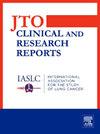可切除的III期非小细胞肺癌患者在新辅助治疗后未进行最终手术的结果——对SAKK试验16/96、16/00、16/01、16/08和16/14的回顾性分析:简要报告
IF 3.5
Q2 ONCOLOGY
引用次数: 0
摘要
新辅助或围手术期治疗,包括免疫检查点抑制剂(ICI),已成为可切除的III期NSCLC患者的新标准。然而,大约20%开始新辅助化疗免疫治疗的患者不会接受最终手术。人们对这些病人知之甚少。方法:我们分析了瑞士临床癌症研究小组(SAKK)的五项研究,这些研究调查了可切除的III-N2期非小细胞肺癌患者的不同新辅助治疗方式。研究治疗包括新辅助顺铂-多西紫杉醇化疗(伴或不伴放疗),在SAKK 16/14试验(n = 68)中联合围手术期杜伐单抗或不伴ICI(非ICI试验,n = 431)。结果499例患者中,102例(20%)未行最终手术。有或没有新辅助ICI的患者取消手术的比例相似(19%对21%,p = 0.9)。在非ici试验和SAKK 16/14中,原因分别为:疾病进展(47%和54%)、不可切除(18%和8%)、医学原因(17%和31%)和未知(18%和8%)。在这些患者中,在SAKK 16/14试验中没有患者接受了治疗目的的挽救治疗,在非ici试验中有17例患者(19%)接受了治疗目的的挽救治疗。接受最终手术的患者的三年总生存率高于未接受手术的患者:78%对32% (SAKK 16/14), 54%对10%(非ici试验)。结论在我们的汇总分析中,接受最终手术的患者生存率高于未接受最终手术的患者。在ICI时代,没有明确手术的患者预后似乎有所改善。本文章由计算机程序翻译,如有差异,请以英文原文为准。
Outcomes in Patients With Resectable Stage III NSCLC Who Did Not Have Definitive Surgery After Neoadjuvant Treatment—A Retrospective Analysis of the SAKK Trials 16/96, 16/00, 16/01, 16/08, and 16/14: A Brief Report
Introduction
Neoadjuvant or perioperative treatment, including an immune checkpoint inhibitor (ICI), has emerged as a new standard for patients with resectable stage III NSCLC. Nevertheless, approximately 20% of patients who start neoadjuvant chemo-immunotherapy will not undergo definitive surgery. Little is known about these patients.
Methods
We analyzed outcomes of patients without definitive surgery from five Swiss Group for Clinical Cancer Research (SAKK) trials that investigated different neoadjuvant treatment modalities in patients with resectable stage III-N2 NSCLC. Study treatment included neoadjuvant cisplatin-docetaxel chemotherapy (with or without radiotherapy), either combined with peri-operative durvalumab in the SAKK 16/14 trial (n = 68) or without an ICI (non-ICI trials, n = 431).
Results
Of the 499 patients, 102 (20%) did not have definitive surgery. Cancellation of surgery occurred in a similar proportion of patients with or without neoadjuvant ICI (19% versus 21%, p = 0.9). Reasons were in non-ICI trials and SAKK 16/14: disease progression (47% and 54%), nonresectability (18% and 8%), medical reasons (17% and 31%), and unknown (18% and 8%), respectively. Of these patients, no patient in SAKK 16/14 and 17 patients (19%) in the non-ICI trials received curative-intended salvage therapy. Three-year overall survival was higher in patients who had definitive surgery compared with those who did not: 78% versus 32% (SAKK 16/14) and 54% versus 10% (non-ICI trials).
Conclusions
In our pooled analysis, patients with definitive surgery had higher survival rates than those without definitive surgery. Prognosis in patients without definitive surgery seems to have improved in the era of ICI.
求助全文
通过发布文献求助,成功后即可免费获取论文全文。
去求助
来源期刊

JTO Clinical and Research Reports
Medicine-Oncology
CiteScore
4.20
自引率
0.00%
发文量
145
审稿时长
19 weeks
 求助内容:
求助内容: 应助结果提醒方式:
应助结果提醒方式:


